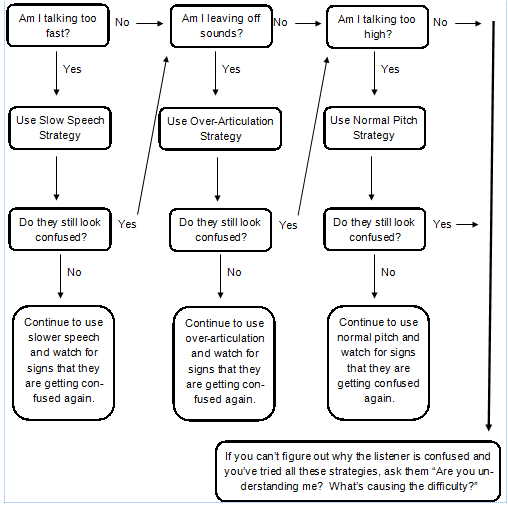Cluttering
Cluttering is a disorder of fluency, for an irregular, too fast speech rate, disfluencies, syllable mergers and often other symptoms such as speech and language errors, phonological errors and attention problems are characteristic. Rumble may be associated with stuttering symptoms.
Also the Battarismus that Tachyphemie and Tumultus sermonis be used for rumble as synonyms. At times, Rumble in the German language was referred to as a Paraphrasia praeceps.
Symptoms
Speech is difficult to understand by irregularities and disturbed rhythm, the attempts are jerky and fast, the sentence patterns can often be wrong. In addition to the hasty Talk According mergers are ( elision ) typical, for example, " Hatür " instead of " doorstep". So there are often ( unstressed ) syllables swallowed. Speaking does not sound fluent in, that is, it is not clear what the person wants to say. Speaking indicates an increased amount also normally occurring disfluencies as interjections (eg, " um " ) and revisions (set of changes ). The person who rumbles, shows little effort in speaking and few side movements ( which occur more frequently in stuttering ). Although there is usually a disorder awareness, just at the moment where the problems occur, individuals are facing difficulty in identifying them.
In addition to these symptoms is often following exercise (secondary symptoms): disorganized speech, and little awareness of speech rate and fluency. It may be already known learning difficulties. Boisterous can be easily distracted and hyperactive and have more often a short attention span and problems in auditory processing.
Although to date no pathophysiological definition of cluttering exists, especially as the phenomenology is still unclear, because it is poorly understood, the possible symptoms are divided into obligatory and optional.
Mandatory symptoms
- For rapid and irregular speech rate
- Syllable or sound mergers ( elision ), volume replacements, sound changes and slips of the tongue
- ? Disfluencies and Embolophrasien (ie phrases, strain, set crashes and repeats)
Optional symptoms
- Speech disorders or language design weaknesses
- Semantic interference and word finding difficulties
- Pragmatic disorders (ie, impaired social executive functions )
- Attention disorders
Therapy
Most of the psychosocial problems are treated first, caused by the rumble. The flow of words is also treated because the work at the rate of speech is very important. It must be practiced with different speech rates, in particular the pause reduction is observed. Also pronunciation, syllable expression and speech problems - if the latter exist - are part of the therapy. If next Rumble is also a stuttering symptoms, it is planned.
Rumble is treated by speech therapists.
Classification
Despite today uncertain aetiology Rumble in the ICD -10 under the group Mental and behavioral disorders in the subgroup Other behavioral and emotional disorders with onset usually occurring in childhood and adolescence subsumed and differential diagnosis compared with the stuttering and tics.
Knowledge and research
Compared to stuttering rumble occurs relatively rarely. Furthermore, there is little literature about this. After many years no book has been published about this fluency disorder, 2004, a medical speech-language monograph of the Bonn speech therapist Ulrike Sick was published. Many interested to rumble therapists (as well as researchers and stakeholders ) have united in May 2007, the International Cluttering Association (ICA ) to future greater research on the disorder; The first World Congress on Cluttering found at this time in Razlog, Bulgaria, instead. The ICA would like to deal at all levels with this disorder and has formed various committees for researchers, therapists, and sufferers. She is represented in many countries, in Germany by Manon Abbink - Spruit and Ulrike Sick.
2014 was started under the leadership of Katrin Neumann with a larger Polterstudie.










